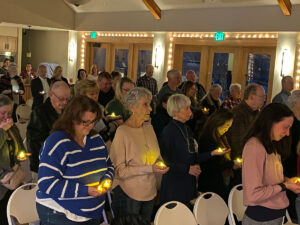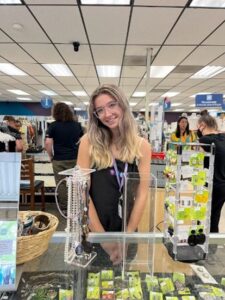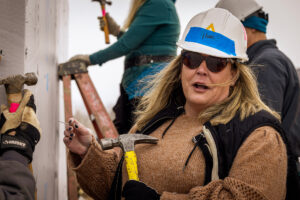by Rachel Stackhouse, TRU Clinical Educator
 If you reside in or travel to remote regions of our country, you’re likely aware of the limited access to healthcare. While those of us in the Denver metro area enjoy a plethora of options, our neighbors just an hour east or west often find themselves with little to no healthcare choices. The healthcare industry, already under pressure from reduced reimbursements, has seen numerous hospice providers shutter their operations in recent years. One such instance is the closure of services in the Estes Park area by a local organization. Estes Park Health announced in October its decision to discontinue home health and hospice services due to financial difficulties. As of December 31st, their hospice services ceased, prompting TRU Community Care to step in with innovative solutions to deliver hospice care to the community in mid-January.
If you reside in or travel to remote regions of our country, you’re likely aware of the limited access to healthcare. While those of us in the Denver metro area enjoy a plethora of options, our neighbors just an hour east or west often find themselves with little to no healthcare choices. The healthcare industry, already under pressure from reduced reimbursements, has seen numerous hospice providers shutter their operations in recent years. One such instance is the closure of services in the Estes Park area by a local organization. Estes Park Health announced in October its decision to discontinue home health and hospice services due to financial difficulties. As of December 31st, their hospice services ceased, prompting TRU Community Care to step in with innovative solutions to deliver hospice care to the community in mid-January.
Rural areas have long been identified as an area of concern for public health. The CDC reports that 15% of Americans live in a rural area, and those who live rurally have an increased risk for injury-related death, heart disease, cancer, stroke, and other illnesses common to hospice patients. The CDC also highlights that the population in these areas tends to be older and frailer in general.1 The National Center for Frontier Communities has been advocating for remote areas since 1997.2 While there is no clear-cut definition of a “Frontier Community,” as this varies by state, in general, a Frontier Community has fewer than six people per square mile or is greater than 30 minutes or 30 miles to common necessity services. In 2011, each state office determined which of their counties were considered Frontier. When all were totaled, the United States had 46% of its land in Frontier areas, mostly concentrated in the western states. 3 Since these remote communities are at a higher risk for injury and chronic illnesses, there ought to be a way to support them; and indeed, there is.
Supporting remote communities is not new for TRU Community Care. TRU’s Tele-Care program launched in 2019, and when COVID hit in 2020, changing the way healthcare functions, TRU was positioned to provide meaningful care remotely. Since then, telehealth has continued to be a staple for some of our patients, and TRU Tele-Care includes remote patient monitoring, vital signs, symptom questions related to the diagnosis, and immediate access to an RN. When we combine this powerful tool with field staff willing to travel to remote areas, we can effectively support our neighbors who live remotely.
In 2021, TRU partnered with an organization in Kansas to provide telehealth monitoring for an area designated as a Frontier Community. During this effort, TRU nurses were able to detect slight changes in a patient’s condition and alert the Kansas team in advance of further decline. Our ongoing commitment to assisting patients who have lost access to their local hospice provider is exemplified in our current model. Although it’s often the case that individuals in remote areas prefer minimal social interaction, those opting for remote care monitoring can benefit from immediate access to nursing assistance. This support ranges from simple tasks like medication refills to more intricate matters such as wound care education or understanding new symptoms and prognoses with the guidance of our nurses. TRU Tele-Care offers a high level of flexibility tailored to the patient’s preferences, whether they seek minimal contact or daily interaction. With a nurse available at a moment’s notice, the patient and family have control over the level of support they receive.
It may be tempting to perceive these issues as a distant, national concern, but closer examination reveals that many Coloradans are directly impacted by rural health disparities. The Colorado Rural Health Center’s data shows that 73% of our counties are rural, with 23 out of 64 designated as Frontier Communities. Our rural residents are 14% more likely to succumb to coronary heart disease compared to their urban counterparts.4 While there are regulatory constraints on how far TRU can extend its in-person care, my tenure of over 7 years at TRU underscores our unwavering dedication to the community. TRU Community Care has earned recognition for catering to all individuals in need of hospice services, irrespective of wealth or geographical proximity. We are committed to continually exploring innovative approaches to serve our remote neighbors to the best of our abilities.
Sources:
- Centers for Disease Control and Prevention. (2023, November 28). About rural health. Centers for Disease Control and Prevention. https://www.cdc.gov/ruralhealth/about.html
- National Center for Frontier Communities. National Center For Frontier Communities. (2023, December 13). https://frontierus.org/
- Healthcare access in rural communities Overview – Rural Health Information Hub. Overview – Rural Health Information Hub. (2022, November 21). https://www.ruralhealthinfo.org/topics/healthcare-access
- Health disparities in rural Colorado – Coruralhealth.org. Health Disparities in Rural Colorado. (n.d.). https://coruralhealth.org/wp-content/uploads/2014/08/IHI-poster-Colorado-Rural-Health-Center.pdf







